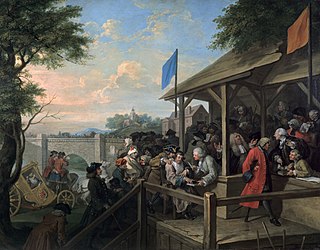Delegated legislation or secondary legislation in the United Kingdom is law that is not enacted by a legislative assembly such as the UK Parliament, but made by a government minister, a delegated person or an authorised body under powers given to them by an Act of Parliament.

Ultra vires is a Latin phrase used in law to describe an act that requires legal authority but is done without it. Its opposite, an act done under proper authority, is intra vires. Acts that are intra vires may equivalently be termed "valid", and those that are ultra vires termed "invalid".
In United States constitutional law, the police power is the capacity of the states and the federal government to regulate behavior and enforce order within their territory for the betterment of the health, safety, morals, and general welfare of their inhabitants. Police power is defined in each jurisdiction by the legislative body, which determines the public purposes that need to be served by legislation. Under the Tenth Amendment to the United States Constitution, the powers not delegated to the federal government are reserved to the states or to the people. As a result, the police power is primarily concentrated within state governments, while the federal government possesses it in limited contexts where it has an express power, such as over conduct occurring within the territories of the United States and activities related to interstate commerce.
Calder v. Bull, 3 U.S. 386 (1798), is a United States Supreme Court case in which the Court decided four important points of constitutional law.

Nordenfelt v Maxim Nordenfelt Guns and Ammunition Co Ltd [1894] AC 535 is a 19th-century English case decided by the House of Lords. The dispute was about restraint of trade, and the judgment declares when such a restraint may become valid.
Judicial review is a part of UK constitutional law that enables people to challenge the exercise of power, usually by a public body. A person who contends that an exercise of power is unlawful may apply to the Administrative Court for a decision. If the court finds the decision unlawful it may have it set aside (quashed) and possibly award damages. A court may impose an injunction upon the public body.

United Kingdom administrative law is part of UK constitutional law that is designed through judicial review to hold executive power and public bodies accountable under the law. A person can apply to the High Court to challenge a public body's decision if they have a "sufficient interest", within three months of the grounds of the cause of action becoming known. By contrast, claims against public bodies in tort or contract are usually limited by the Limitation Act 1980 to a period of 6 years.

The statutory rules of Northern Ireland are the principal form in which delegated legislation is made in Northern Ireland.

The United Kingdom constitutional law concerns the governance of the United Kingdom of Great Britain and Northern Ireland. With the oldest continuous political system on Earth, the British constitution is not contained in a single code but principles have emerged over centuries from common law statute, case law, political conventions and social consensus. In 1215, Magna Carta required the King to call "common counsel" or Parliament, hold courts in a fixed place, guarantee fair trials, guarantee free movement of people, free the church from the state, and it enshrined the rights of "common" people to use the land. After the English Civil War and the Glorious Revolution 1688, Parliament won supremacy over the monarch, the church and the courts, and the Bill of Rights 1689 recorded that the "election of members of Parliament ought to be free". The Act of Union 1707 unified England, Wales and Scotland, while Ireland was joined in 1800, but the Republic of Ireland formally separated between 1916 and 1921 through bitter armed conflict. By the Representation of the People Act 1928, almost every adult man and woman was finally entitled to vote for Parliament. The UK was a founding member of the International Labour Organization (ILO), the United Nations, the Commonwealth, the Council of Europe, and the World Trade Organization (WTO).

Ashby v White (1703) 92 ER 126, is a foundational case in UK constitutional law and English tort law. It concerns the right to vote and misfeasance of a public officer. Lord Holt laid down the important principle that where there is injury in the absence of financial loss (injuria sine damno) the law makes the presumption of damage and that it is sufficient to demonstrate that a right has been infringed.
Administrative liability in English law is an area of law concerning the tortious liability of public bodies in English law. The existence of private law tort applying to public bodies is a result of Diceyan constitutional theory suggesting that it would be unfair if a separate system of liability existing for government and officials. Therefore, a public body which acts ultra vires is liable in tort is a cause of action can be established just like any individual would be. An ultra vires action will not, per se, give rise to damages Therefore, a claimant will have to fit into one of the recognised private law courses of action. These areas in which a public body can incur private liability in tort were described by Lord Browne Wilkinson in X v Bedfordshire County Council [1995] 3 All ER 353 (HL).

The constitution of the United Kingdom comprises the written and unwritten arrangements that establish the United Kingdom of Great Britain and Northern Ireland as a political body. Unlike in most countries, no official attempt has been made to codify such arrangements into a single document, thus it is known as an uncodified constitution. This enables the constitution to be easily changed as no provisions are formally entrenched.

R v Secretary of State for Foreign and Commonwealth Affairs, ex parte Bancoult [2008] UKHL 61 is a UK constitutional law case in the House of Lords concerning the removal of the Chagos Islanders and the exercise of the Royal Prerogative. The Chagos Islands, acquired by the United Kingdom in 1814, were reorganised as the British Indian Ocean Territory (BIOT) in 1965 for the purpose of removing its inhabitants. Under a 1971 ordinance, the Chagossians were forcibly removed, and the central island of Diego Garcia leased to the United States for use as a military outpost.

Errors as to precedent facts, sometimes called jurisdictional facts, in Singapore administrative law are errors committed by public authorities concerning facts that must objectively exist or not exist before the authorities have the power to take actions or make decisions under legislation. If an error concerning a precedent fact is made, the statutory power has not been exercised lawfully and may be quashed by the High Court if judicial review is applied for by an aggrieved person. The willingness of the Court to review such errors of fact is an exception to the general rule that the Court only reviews errors of law.

Administrative law in Singapore is a branch of public law that is concerned with the control of governmental powers as exercised through its various administrative agencies. Administrative law requires administrators – ministers, civil servants and public authorities – to act fairly, reasonably and in accordance with the law. Singapore administrative law is largely based on English administrative law, which the nation inherited at independence in 1965.

Illegality is one of the three broad headings of judicial review of administrative action in Singapore, the others being irrationality and procedural impropriety. To avoid acting illegally, an administrative body or public authority must correctly understand the law regulating its power to act and to make decisions, and give effect to it.
Fettering of discretion by a public authority is one of the grounds of judicial review in Singapore administrative law. It is regarded as a form of illegality. An applicant may challenge a decision by an authority on the basis that it has either rigidly adhered to a policy it has formulated, or has wrongfully delegated the exercise of its statutory powers to another body. If the High Court finds that a decision-maker has fettered its discretion, it may hold the decision to be ultra vires – beyond the decision-maker's powers – and grant the applicant a suitable remedy such as a quashing order to invalidate the decision.
The failure of a public authority to take into account relevant considerations and the taking of irrelevant ones into account are grounds of judicial review in Singapore administrative law. They are regarded as forms of illegality.

Canada (AG) v British Columbia (AG), also known as the Reference as to constitutional validity of certain sections of The Fisheries Act, 1914 and the Fish Canneries Reference, is a significant decision of the Judicial Committee of the Privy Council in determining the boundaries of federal and provincial jurisdiction in Canada. It is also significant, in that it represented a major victory in the fight against discrimination aimed at Japanese Canadians, which was especially prevalent in British Columbia in the early part of the 20th century.
South African administrative law is the branch of public law which regulates the legal relations of public authorities, whether with private individuals and organisations or with other public authorities, or better say, in present-day South Africa, which regulates "the activities of bodies that exercise public powers or perform public functions, irrespective of whether those bodies are public authorities in a strict sense." According to the Constitutional Court, administrative law is "an incident of the separation of powers under which the courts regulate and control the exercise of public power by the other branches of government."











